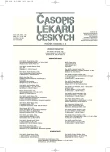-
Medical journals
- Career
Direct-to-consumer genetic testing also in our country
Authors: R. Brdička 1; M. Macek Jr. 2
Authors‘ workplace: Ústav experimentální medicíny AV ČR a Ústav hematologie a krevní transfuze, Praha 1; Univerzita Karlova v Praze, 2. lékařská fakulta, Ústav biologie a lékařské genetiky FN Motol 2
Published in: Čas. Lék. čes. 2009; 148: 56-58
Category: Topic
Overview
The main features of direct-to-consumer (DTC) genetic testing suffers from the loss of personal contact between a client and a genetic consultant, who is apt to assess the usefulness of genetic testing and to interpret results of genetic tests and who is also sufficiently trained to provide professional way of consultation. Laboratories offering these services often inform clients by phone, and neglect their identification – the samples examined may be anonymous. Also samples from children are accepted for testing. Quality control is not mandatory and laboratory genetic testing is not a licenced business in the Czech Republic. Because of these problems, which are not specific to our situation, but rather global, the possibility of the ban concerning these activities is being discussed in several European countries.
Key words:
genetic testing, DTC (direct-to-consumer) genetic testing, regulations of genetic testing.
Sources
1. Gresham D, et al. Gene-Wide Detection of Polymorhisms at Nucleotide Resolution with a Single DNA Microarray. Science 2006; 311 : 1932–1936.
2. Hirschhorn JN, Daly MJ. Genome-wide association studies for common diseases and complex traits. Nature Rev Genetics 2005; 6 : 95–108.
3. Hinds DA, et al. Whole-genome patterns of common DNA variation in three human populatios. Science 2005; 307 : 1072–1079.
4. Jackson CH, et al. Bayesian graphical models for regression on multiple data sets with different variables. Biostatistics 2008; chris.jackson@mrc-bsu.cam.ac.uk.
5. Brdička R. Klinická validita a užitečnost molekulárně genetických laboratorních zkoušek. Čas Lék čes 2009; 148 : 10–15.
6. Borry P, Howard H. DTC Genetic Services: A Look Across the Pond Am J Bioeth 2008; 8 : 14–16.
7. Howard HC, Borry P. Direct-to-consumer more questions than benefits? Personalized Medicine 2008; 5 : 317–320.
8. Wolinsky, H. Do-it-yourself diagnosis EMBO Rep 2005; 6 : 805–807, http://www.pubmedcentral.nih.gov/articlerender.fcgi? artid=1369172
9. Borry P. Europe to ban direct-to-consumer genetic tests? Nature Biotechnology 2008; 26 : 736.
10. Washington G. 2 Reports http://www.g2reports.com/issues/ DTTR/2008_8/1617382–1.html
11. ASHG Statement* on Direct-to-Consumer Genetic Testing in the United States American. Journal of Human Genetics 2007; 81 : 635–637, www.ashg.org/pdf/dtc_statement.pdf
12. Gollust SE, et al. Limitations of Direct-to-Consumer Advertising for Clinical Genetic Testing. JAMA 2002; 288 : 1762–1767.
13. Levin M. Direct-to-Consumer Advertising of Genetic Testing. JAMA 2003; 289 : 45–46.
14. Hudson K, et al. ASHG Statement on Direct-to-Consumer Genetic Testing in the United States. Obstetrians and Gynecology 2007; 110 : 1392–1395.
15. Borry P, et al. Direct-to-consumer genetic testing: genome scanning services. Also for children? Nat Rev Genet 2009; 10 : 8.
16. Gniady JA. Fordham Law Rev 2008; 76 : 2429–2475.
17. American Society of Clinical Oncology policy statement update: genetic testing for cancer susceptibility. J Clin Onkol 2003; 21 : 2397–2406.
18. Borry P, et al. Presymptomatic and predictive genetic testing in minors: a systematic review of guidelines and position papers. Clin Genet 2006; 70 : 374–381.
19. Daar AS, Winter PA. Pharmacogenetics and geopgraphical ancestry: implications for drug development and global health. Natur Reviews 2005; 6 : 241–246.
20. Waters M, Jackson M. Databases applicable to quantitative hazard/risk assessment – towards a predictive startem toxicology. Toxicol. Appl. Pharmacol 2008; doi:10.1016/j.taap2007. 12.036
21. Ebi KL, McGregor G. Climate Change, Tropospheric Ozone and Particulate Matter, and Health Impacts.Environ Health Perspect 2008; 116 : 1449–1455.
22. Valavanidis A, Fiotakis K, Vlachogianni T. Airborne particulate matter and human health: toxicological assessment and importance of size and composition of particles for oxidative damage and carcinogenic mechanisms.J Environ Sci Health C Environ Carcinog Ecotoxicol Rev 2008; 26 : 339–362.
23. Hartzband P, Groopman J. Money and the changing culture of medicine. N Engl J Med 2009; 360 : 101–103.
24. Wasson K, Cook ED, Helzlsouer K. Direct-to-consumer online genetic testing and the four principles: an analysis of the ethical issues. Ethics Med 2006; 22 : 83–91.
25. Goetz P, et al. Hrozí zneužití – diskreditace lékařské genetiky. Čas Lék čes 2008; 147 : 159–161.
Internet
1. Direct-to-Consumer Genetic Testing: http://sandwalk.blogspot. com/2008/01/direct-to-consumer-genetic-testing.html
2. Novelty DTC genetic testing company torpedoes their way into NY Times: http://www.thinkgene.com/novelty-dtc-genetic-testing-company-torpedoes-their-way-into-ny-times/)
3. Can a DNA home test help predict your health?: http://www.msnbc. msn.com/id/22209853/
4. New Yorker Ridicules DTC Genetic Testing: http://blog.bioethics. net/2008/09/new-yorker-ridicules-dtc-genetic-testing/
5. Work in Progress!: www.jorge-sequeiros.blogspot.com
Labels
Addictology Allergology and clinical immunology Angiology Audiology Clinical biochemistry Dermatology & STDs Paediatric gastroenterology Paediatric surgery Paediatric cardiology Paediatric neurology Paediatric ENT Paediatric psychiatry Paediatric rheumatology Diabetology Pharmacy Vascular surgery Pain management Dental Hygienist
Article was published inJournal of Czech Physicians

-
All articles in this issue
- Direct-to-consumer genetic testing also in our country
- Contemporary methods in the treatment of chronic pulmonary hypertension
- Hypertension in pregnancy
- Conservative treatment of diabetic microangiopathy and macroangiopathy
- Abdominal obesity
- The thyroid gland-running the show behind the scenes – 1.rst part
- Molecular biology and immunopathogenetic mechanisms of sepsis
- Double-balloon enteroscopy
- Winners over addictions (9 types)
- Journal of Czech Physicians
- Journal archive
- Current issue
- Online only
- About the journal
Most read in this issue- Hypertension in pregnancy
- Abdominal obesity
- Conservative treatment of diabetic microangiopathy and macroangiopathy
- Double-balloon enteroscopy
Login#ADS_BOTTOM_SCRIPTS#Forgotten passwordEnter the email address that you registered with. We will send you instructions on how to set a new password.
- Career

